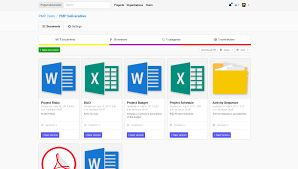
The Power of Django Document Management System
Document management systems are crucial for businesses to efficiently organize, store, and retrieve documents. One popular choice for developing robust document management systems is Django, a high-level Python web framework that encourages rapid development and clean, pragmatic design.
With Django’s built-in features and extensibility, developers can create customized document management systems tailored to the specific needs of their organization. Here are some key advantages of using Django for document management:
Scalability and Flexibility
Django provides a scalable and flexible framework that can handle large volumes of documents and users. Its modular structure allows developers to add or modify features easily as the system grows.
Security
Django offers robust security features to protect sensitive documents from unauthorized access. With built-in authentication mechanisms, role-based access control, and encryption options, developers can ensure data integrity and confidentiality.
Search and Retrieval Capabilities
Django’s powerful search functionality enables users to quickly locate specific documents based on metadata or content keywords. This feature streamlines document retrieval processes and enhances productivity within the organization.
Version Control
Version control is essential in document management systems to track changes, maintain audit trails, and prevent data loss. Django supports versioning through libraries like django-reversion, allowing users to revert to previous versions of documents if needed.
Integration with Other Systems
Django seamlessly integrates with third-party applications and services, enabling organizations to connect their document management system with other business tools such as CRM software, cloud storage services, or collaboration platforms.
In conclusion, leveraging Django for building a document management system empowers organizations with a reliable, secure, and scalable solution for managing their documents effectively. With its rich set of features and flexibility, Django proves to be a valuable framework for creating innovative document management solutions that meet the evolving needs of modern businesses.
Top 5 Tips for Building an Efficient Document Management System with Django
- Organize your documents using Django models with appropriate fields for storing document metadata.
- Implement user authentication and authorization to control access to documents based on user roles.
- Utilize Django Rest Framework for building APIs to interact with the document management system.
- Consider using third-party libraries like django-storages for managing file storage in cloud services.
- Implement search functionality using tools like Django Haystack or Elasticsearch for efficient document retrieval.
Organize your documents using Django models with appropriate fields for storing document metadata.
To effectively organize your documents within a Django document management system, it is essential to utilize Django models with appropriate fields dedicated to storing document metadata. By defining specific fields such as title, description, author, creation date, file type, and keywords within the Django models, you can establish a structured framework for categorizing and managing documents efficiently. This approach not only facilitates easy retrieval and search functionalities but also ensures that each document is associated with relevant metadata for better organization and accessibility within the system.
Implement user authentication and authorization to control access to documents based on user roles.
Implementing user authentication and authorization in a Django document management system is essential for controlling access to documents based on user roles. By setting up role-based permissions, organizations can ensure that only authorized users have the appropriate level of access to view, edit, or delete documents. This security measure not only protects sensitive information but also enhances data integrity and compliance with privacy regulations. With Django’s robust authentication mechanisms, developers can tailor access control settings to align with the organization’s hierarchy and workflow, providing a secure and efficient document management solution for users at all levels.
Utilize Django Rest Framework for building APIs to interact with the document management system.
To enhance the functionality and accessibility of a Django document management system, it is highly recommended to leverage Django Rest Framework for building APIs that facilitate seamless interaction with the system. By utilizing Django Rest Framework, developers can create robust and standardized APIs that enable users to perform various operations such as uploading, downloading, searching, and managing documents programmatically. This integration not only streamlines the process of integrating external applications with the document management system but also enhances the overall user experience by providing a more efficient and flexible way to interact with the stored documents.
Consider using third-party libraries like django-storages for managing file storage in cloud services.
When developing a Django document management system, it is advisable to consider utilizing third-party libraries such as django-storages for efficient file storage management in cloud services. By integrating django-storages into your system, you can seamlessly connect Django with popular cloud storage providers like Amazon S3 or Google Cloud Storage. This integration not only simplifies the process of storing and retrieving documents but also enhances scalability and reliability by leveraging the robust infrastructure of cloud services. Embracing third-party libraries like django-storages can significantly optimize the performance and functionality of your document management system while ensuring seamless integration with cloud storage solutions.
Implement search functionality using tools like Django Haystack or Elasticsearch for efficient document retrieval.
To enhance the efficiency of document retrieval in a Django document management system, it is highly recommended to implement robust search functionality using tools like Django Haystack or Elasticsearch. By integrating these tools, users can benefit from advanced search capabilities that enable quick and accurate retrieval of documents based on metadata or content keywords. This not only streamlines the document access process but also boosts productivity within the organization by providing users with a seamless and efficient way to locate the information they need.
